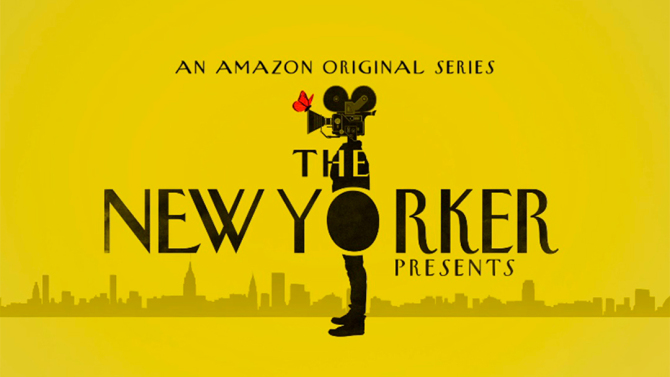“The New Yorker Presents” keeps things specific to the publication’s brand—it doesn’t slouch on presentation and its cultural curiosity is addictive. Better yet, monocle-using mascot be damned, the series maintains the non-snooty publication’s accessibility via an Amazon subscription, instead of anyone maxing out trial reads on their website, or making your therapist wait for you to finish their waiting room’s copy when I was 17. No surprise, “The New Yorker Presents” is what happens when intellectuals run rampant on what jazzes them, albeit with crisp filmmaking as their latest writing instrument.
Structured as a sampler of various New Yorker pieces, the series (made of 30-minute episodes, two released each week) boasts brevity and levity, especially with its reoccurring small sections: The publication’s famous cartoons come to lapse through fast time-lapse snippets simply called “Cartoon,” showing an individual cartoonist working at their desk, treating the anticipated caption as the punchline not just to the art but the creation itself. “Around Town” is a similarly charming section, as it takes a camera to various nooks and niches of New York City to observe life in progress, revealing only the address of its place of focus (such as when we fellow a seeing eye dog, or witness a king of fried chicken at work). These segments keep the series inspired, enflaming the intrigue for culture that takes viewers to its longer passages.
The centerpieces for the series are the short documentary features, which complete the publication’s mission of expanding its brand in terms of audience and expectation. Of course, that’s what happens when you farm out work to the likes of concrete talents like directors Steve James (“Life Itself“) Jesse Moss (“The Overnighters“) or Lucy Walker (“Countdown to Zero”). With their thoughtful, slick productions, they take viewers outside of the publication’s often local gaze, and bring a former New Yorker article to a cinematic life of its own. The docs cover an impressive amount of territory in as little as five minutes, offering concise portraits, investigations and excavations into assuredly fascinating topics; from Moss’ absolutely incendiary look into wrongful killings by police in Albuquerque, New Mexico, to Walker’s heartbreaking portrait of a Los Angeles artist and chef. You may never think of youth bull riding, homosexual Mexican wrestlers or the Naked Cowboy’s father the same again after these shorts.
Boasting the unpredictability of a grab bag (though I did watch a special food-themed episode in the seven I binged), the arrangement completely varies on format and topic, from visual essays (a Jed Rothstein piece about the power of driving a car compared to owning a gun is triumphant) to a poem reading by Andrew Garfield, who delivers short prose to the camera with an excited twinkle in his eye as if he wrote it himself. Narrative shorts pop in every now and then, often like cartoons come to life, boasting droll humor and a reappearing Brett Gelman. Very little in the programming falls flat, even if some topics prove more gripping than others.
What remains consistent about this endeavor in all segments is the quality of its production, the investment in top-grade cinematography, music and editing (it’s ready for screens of all sizes). The series’ production value alone is a reminder of how web content is no longer a backdoor for viewership, but a vital enterprise to be reckoned with. Guided by its values and standards, the publication continues to be a leader and succeeds with such a challenge—thanks to this series, the New Yorker could soon be associated with short films just as immediately as its magazine roots from nearly 100 years ago.












